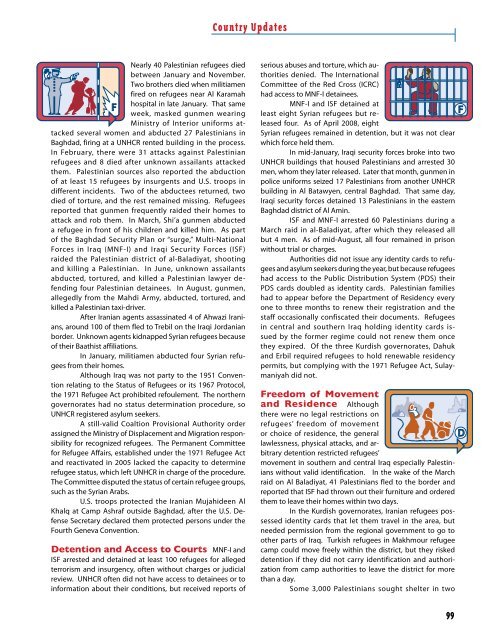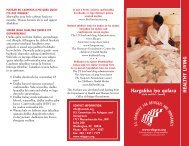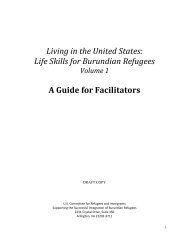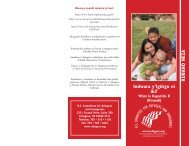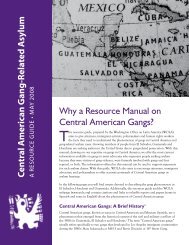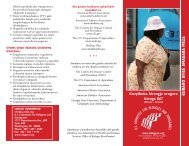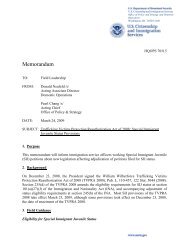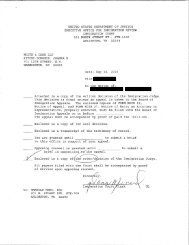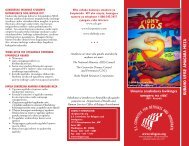Refugees and Asylum Seekers
Refugees and Asylum Seekers
Refugees and Asylum Seekers
You also want an ePaper? Increase the reach of your titles
YUMPU automatically turns print PDFs into web optimized ePapers that Google loves.
Nearly 40 Palestinian refugees died<br />
between January <strong>and</strong> November.<br />
Two brothers died when militiamen<br />
fired on refugees near Al Karamah<br />
hospital in late January. That same<br />
F<br />
week, masked gunmen wearing<br />
Ministry of Interior uniforms attacked<br />
several women <strong>and</strong> abducted 27 Palestinians in<br />
Baghdad, firing at a UNHCR rented building in the process.<br />
In February, there were 31 attacks against Palestinian<br />
refugees <strong>and</strong> 8 died after unknown assailants attacked<br />
them. Palestinian sources also reported the abduction<br />
of at least 15 refugees by insurgents <strong>and</strong> U.S. troops in<br />
different incidents. Two of the abductees returned, two<br />
died of torture, <strong>and</strong> the rest remained missing. <strong>Refugees</strong><br />
reported that gunmen frequently raided their homes to<br />
attack <strong>and</strong> rob them. In March, Shi’a gunmen abducted<br />
a refugee in front of his children <strong>and</strong> killed him. As part<br />
of the Baghdad Security Plan or “surge,” Multi-National<br />
Forces in Iraq (MNF-I) <strong>and</strong> Iraqi Security Forces (ISF)<br />
raided the Palestinian district of al-Baladiyat, shooting<br />
<strong>and</strong> killing a Palestinian. In June, unknown assailants<br />
abducted, tortured, <strong>and</strong> killed a Palestinian lawyer defending<br />
four Palestinian detainees. In August, gunmen,<br />
allegedly from the Mahdi Army, abducted, tortured, <strong>and</strong><br />
killed a Palestinian taxi-driver.<br />
After Iranian agents assassinated 4 of Ahwazi Iranians,<br />
around 100 of them fled to Trebil on the Iraqi Jordanian<br />
border. Unknown agents kidnapped Syrian refugees because<br />
of their Baathist affiliations.<br />
In January, militiamen abducted four Syrian refugees<br />
from their homes.<br />
Although Iraq was not party to the 1951 Convention<br />
relating to the Status of <strong>Refugees</strong> or its 1967 Protocol,<br />
the 1971 Refugee Act prohibited refoulement. The northern<br />
governorates had no status determination procedure, so<br />
UNHCR registered asylum seekers.<br />
A still-valid Coaltion Provisional Authority order<br />
assigned the Ministry of Displacement <strong>and</strong> Migration responsibility<br />
for recognized refugees. The Permanent Committee<br />
for Refugee Affairs, established under the 1971 Refugee Act<br />
<strong>and</strong> reactivated in 2005 lacked the capacity to determine<br />
refugee status, which left UNHCR in charge of the procedure.<br />
The Committee disputed the status of certain refugee groups,<br />
such as the Syrian Arabs.<br />
U.S. troops protected the Iranian Mujahideen Al<br />
Khalq at Camp Ashraf outside Baghdad, after the U.S. Defense<br />
Secretary declared them protected persons under the<br />
Fourth Geneva Convention.<br />
Detention <strong>and</strong> Access to Courts MNF-I <strong>and</strong><br />
ISF arrested <strong>and</strong> detained at least 100 refugees for alleged<br />
terrorism <strong>and</strong> insurgency, often without charges or judicial<br />
review. UNHCR often did not have access to detainees or to<br />
information about their conditions, but received reports of<br />
serious abuses <strong>and</strong> torture, which authorities<br />
denied. The International<br />
Committee of the Red Cross (ICRC)<br />
had access to MNF-I detainees.<br />
MNF-I <strong>and</strong> ISF detained at<br />
least eight Syrian refugees but released<br />
four. As of April 2008, eight<br />
Syrian refugees remained in detention, but it was not clear<br />
which force held them.<br />
In mid-January, Iraqi security forces broke into two<br />
UNHCR buildings that housed Palestinians <strong>and</strong> arrested 30<br />
men, whom they later released. Later that month, gunmen in<br />
police uniforms seized 17 Palestinians from another UNHCR<br />
building in Al Batawyen, central Baghdad. That same day,<br />
Iraqi security forces detained 13 Palestinians in the eastern<br />
Baghdad district of Al Amin.<br />
ISF <strong>and</strong> MNF-I arrested 60 Palestinians during a<br />
March raid in al-Baladiyat, after which they released all<br />
but 4 men. As of mid-August, all four remained in prison<br />
without trial or charges.<br />
Authorities did not issue any identity cards to refugees<br />
<strong>and</strong> asylum seekers during the year, but because refugees<br />
had access to the Public Distribution System (PDS) their<br />
PDS cards doubled as identity cards. Palestinian families<br />
had to appear before the Department of Residency every<br />
one to three months to renew their registration <strong>and</strong> the<br />
staff occasionally confiscated their documents. <strong>Refugees</strong><br />
in central <strong>and</strong> southern Iraq holding identity cards issued<br />
by the former regime could not renew them once<br />
they expired. Of the three Kurdish governorates, Dahuk<br />
<strong>and</strong> Erbil required refugees to hold renewable residency<br />
permits, but complying with the 1971 Refugee Act, Sulaymaniyah<br />
did not.<br />
Freedom of Movement<br />
<strong>and</strong> Residence Although<br />
there were no legal restrictions on<br />
refugees’ freedom of movement<br />
or choice of residence, the general<br />
lawlessness, physical attacks, <strong>and</strong> arbitrary<br />
detention restricted refugees’<br />
movement in southern <strong>and</strong> central Iraq especially Palestinians<br />
without valid identification. In the wake of the March<br />
raid on Al Baladiyat, 41 Palestinians fled to the border <strong>and</strong><br />
reported that ISF had thrown out their furniture <strong>and</strong> ordered<br />
them to leave their homes within two days.<br />
In the Kurdish governorates, Iranian refugees possessed<br />
identity cards that let them travel in the area, but<br />
needed permission from the regional government to go to<br />
other parts of Iraq. Turkish refugees in Makhmour refugee<br />
camp could move freely within the district, but they risked<br />
detention if they did not carry identification <strong>and</strong> authorization<br />
from camp authorities to leave the district for more<br />
than a day.<br />
Some 3,000 Palestinians sought shelter in two<br />
F<br />
D<br />
99


